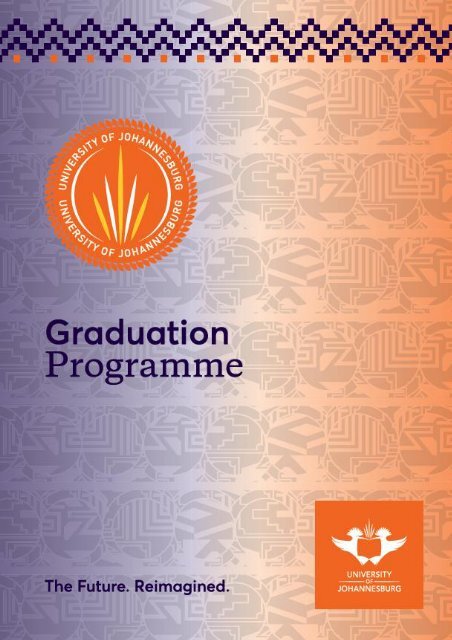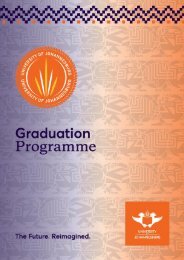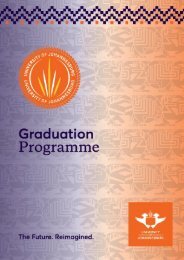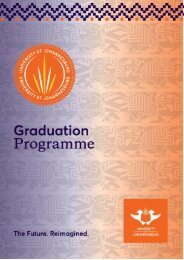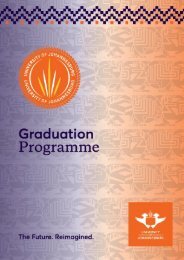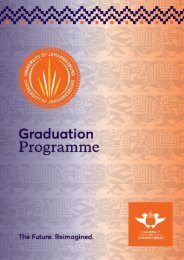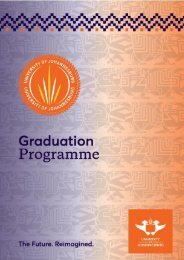16-Oct-2019
Create successful ePaper yourself
Turn your PDF publications into a flip-book with our unique Google optimized e-Paper software.
1
Welcome to the<br />
Graduation Ceremony<br />
of the<br />
University of Johannesburg<br />
<strong>16</strong> <strong>Oct</strong>ober <strong>2019</strong><br />
Welkom by die<br />
Gradeplegtigheid<br />
van die<br />
Universiteit van Johannesburg<br />
<strong>16</strong> Oktober <strong>2019</strong><br />
Le a Amogelwa<br />
Moletlong wa Dikapešo wa<br />
Yunibesithi ya Johannesburg<br />
<strong>16</strong> Diphalane <strong>2019</strong><br />
Niyamukelwa<br />
eMcimbini wokweThweswa kweZiqu<br />
weNyuvesi yaseJohannesburg<br />
<strong>16</strong> kuMfumfu <strong>2019</strong><br />
2
UNIVERSITY OF JOHANNESBURG<br />
CHANCELLOR<br />
Prof NS Ndebele<br />
BA (Lesotho), MA (Cambridge UK), PhD (Denver USA)<br />
SENIOR OFFICE-BEARERS OF THE UNIVERSITY<br />
VICE-CHANCELLOR AND PRINCIPAL<br />
Prof T Marwala<br />
BS Eng (Case Western Reserve USA), MEng (UP), PhD (Cambridge UK)<br />
DEPUTY VICE-CHANCELLOR ACADEMIC<br />
Prof A Parekh<br />
BA, BA Hons, MA (UDW), MA (Kansas USA), DPhil (UDW)<br />
DEPUTY VICE-CHANCELLOR: RESEARCH AND INTERNATIONALISATION<br />
Prof S Sinha<br />
BEng, MEng, PhD (UP)<br />
REGISTRAR<br />
Prof IC Burger<br />
BA, HEd, BA Hons, MA, PhD (RAU)<br />
CHIEF FINANCIAL OFFICER<br />
Ms N Mamorare<br />
BCom (Rhodes), BCom Hons (UKZN), CA (SA)<br />
CHIEF OPERATING OFFICER<br />
Prof A Swart<br />
NDip, NHDip (TWR), BEd, MEd (RAU), DTech (TWR)<br />
GENERAL COUNSEL<br />
Prof PH O’Brien<br />
BCom, LLB, LLM, LLD (RAU)<br />
SENIOR EXECUTIVE DIRECTOR IN THE VICE-CHANCELLOR’S OFFICE<br />
Dr N Vukuza<br />
BA (Fort Hare), BA Hons (Rhodes), DTE (UNISA), MA (Wits), PhD (Stellenbosch)<br />
3
EXECUTIVE DEANS<br />
COLLEGE OF BUSINESS AND ECONOMICS<br />
Prof D van Lill<br />
BSc, BSc Hons, MSc, PhD (US)<br />
FACULTY OF ART, DESIGN AND ARCHITECTURE<br />
Ms A Breytenbach (Acting)<br />
BArch (UP), MBA (UJ)<br />
FACULTY OF EDUCATION<br />
Prof SJ Gravett<br />
BA, HEd (PU for CHE), BEd, MEd, DEd (RAU)<br />
FACULTY OF ENGINEERING AND THE BUILT ENVIRONMENT<br />
Prof DJ Mashao<br />
BSc Eng (UCT), MSc Eng (UCT), MSc AM (Brown, USA), PhD (Brown, USA)<br />
FACULTY OF HEALTH SCIENCES<br />
Prof S Khan<br />
BSc, BSc Hons, MSc, PhD (UWC)<br />
FACULTY OF HUMANITIES<br />
Prof AB Broadbent<br />
BA, BA Hons, MPhil, PhD (Cambridge UK)<br />
FACULTY OF LAW<br />
Prof LG Mpedi<br />
B Juris, LLB (Vista), LLM (RAU), LLD (UJ)<br />
FACULTY OF SCIENCE<br />
Prof D Meyer<br />
BSc, BSc Hons, MSc (RAU), PhD (California USA)<br />
4
MEMBERS OF COUNCIL<br />
CHAIRPERSON<br />
Mr MS Teke<br />
DEPUTY CHAIRPERSON<br />
Dr Y Ndema<br />
MEMBERS<br />
Prof H Abrahamse<br />
Mr FM Baleni<br />
Mr TM Ditshego<br />
Ms S Dlamini<br />
Ms K Gugushe<br />
Prof D Hildebrandt<br />
Ms X Kakana<br />
Mr G Khosa<br />
Mr MS Khoza<br />
Ms K Khumalo<br />
Ms B Madikizela<br />
Mr M Mahlasela<br />
Prof T Marwala<br />
Mr T Mati<br />
Ms Z Matlala<br />
Prof A Parekh<br />
Dr WP Rowland<br />
Prof A Strydom<br />
PRESIDENT OF CONVOCATION<br />
Dr BM Diale<br />
5
Programme<br />
Wednesday, <strong>16</strong> <strong>Oct</strong>ober <strong>2019</strong> at 13:00<br />
To ensure good order during the ceremony all those present are requested to leave<br />
the Auditorium only after the ceremony has been concluded.<br />
The academic procession enters the Auditorium and the members of the procession take<br />
their seats on the stage.<br />
The choir sings Gaudeamus Igitur (or a CD is played) while those present remain<br />
standing.<br />
The Chancellor constitutes the congregation.<br />
Choir.<br />
Welcome.<br />
The relevant Executive Dean presents the candidates to the Chancellor for the<br />
conferment of a degree/diploma/certificate.<br />
Singing of the National Anthem.<br />
The Chancellor dissolves the congregation.<br />
The academic procession leaves the Auditorium while those present remain standing.<br />
Lenaneo<br />
Laboraro, <strong>16</strong> Diphalane <strong>2019</strong> ka 13:00<br />
Go kgonthiša gore dilo di sepela ka tshwanelo nakong ya moletlo, bohle bao ba tlilego<br />
moletlong ba kgopelwa go tšwa ka Holong ya kopano feela ka morago ga ge moletlo o<br />
phethilwe.<br />
Sehlopha sa dirutegi se tsena ka Holong ya kopano gomme maloko a sehlopha se a dula<br />
ditulong tša ona sefaleng.<br />
Khwaere e opela Gaudeamus Igitur (goba CD e tlo bapalwa) mola bao ba lego gona ba<br />
tšwela pele go ema.<br />
Mokhanseliri o kopanya phuthego.<br />
Khwaere.<br />
Dikamogelo.<br />
Hlogophethiši ya maleba ya lefapha e hlagiša dialoga go Mokhanseliri gore di newe<br />
tikrii/diploma/setifikeiti.<br />
Go opelwa ga Koša ya Setšhaba.<br />
Mokhanseliri o phatlalatša phuthego.<br />
Sehlopha sa dirutegi se tšwa ka Holong ya kopano mola bao ba lego gona ba tšwela pele<br />
go ema.<br />
6
Program<br />
Woensdag, <strong>16</strong> Oktober <strong>2019</strong> om 13:00<br />
Ter wille van die ordelike verloop van die plegtigheid<br />
word alle aanwesiges vriendelik versoek<br />
om die Ouditorium nie voor die einde van die plegtigheid te verlaat nie.<br />
Die akademiese prosessie kom die Ouditorium binne en neem op die verhoog plaas.<br />
Die koor sing Gaudeamus Igitur (of ‘n CD word gespeel) terwyl die aanwesiges staan.<br />
Die Kanselier stel die kongregasie saam.<br />
Koor.<br />
Verwelkoming.<br />
Die betrokke uitvoerende dekaan stel die kandidate aan die Kanselier voor vir die<br />
toekenning van ‘n graad/diploma/sertifikaat.<br />
Sing van die volkslied.<br />
Die Kanselier ontbind die kongregasie.<br />
Terwyl die aanwesiges bly staan, verlaat die akademiese prosessie die Ouditorium.<br />
Uhlelo<br />
uLwesithathu, <strong>16</strong> kuMfumfu <strong>2019</strong> ngelo-13:00<br />
Ukuze kuqinisekwe ukuthi konke kuhamba kahle ngesikhathi somcimbi, bonke abakhona<br />
bacelwa ukuba baphume eHholweni kuphela lapho umcimbi usuphothuliwe.<br />
Udwendwe lezifundiswa lungena ehholweni bese amalungu odwendwe ahlala phansi<br />
esiteji.<br />
Ikwaya icula i-Gaudeamus Igitur (noma kudlalwa iCD) ngalenkathi labo abakhona<br />
besamile.<br />
UShansela uhlanganisa ibandla.<br />
Ikwaya.<br />
Ukwamukelwa.<br />
Izinhloko Eziyiziphathimandla ezithintekayo zethula abafundi kuShansela weNyuvesi<br />
ukuze bathole idigiri/idiploma/isitifiketi.<br />
Kuculwa iHubo Lesizwe.<br />
7
Gaudeamus Igitur<br />
Gaudeamus igitur,<br />
Juvenes dum sumus;<br />
Post iucundum iuventutem,<br />
Post molestam senectutem<br />
Nos habebit humus.<br />
Vivat academia,<br />
Vivant professores,<br />
Vivat membrum quodlibet,<br />
Vivat membra quaelibet;<br />
Semper sint in flore!<br />
English<br />
Let us rejoice, therefore,<br />
While we are young.<br />
After a pleasant youth<br />
After a troubling old age<br />
The earth will have us.<br />
Long live the academy!<br />
Long live the professors!<br />
Long live each student;<br />
Long live the whole fraternity;<br />
For ever may they flourish!<br />
Sesotho sa Leboa<br />
Ka gona, a re thabeng,<br />
Re sa le ba bafsa.<br />
Ka morago ga bofsa bjo bo bose<br />
Ka morago ga go tšofala mo go nago le<br />
mathata<br />
Lefase le tla ba le rena.<br />
Phela thuto phela!<br />
Phelang diprofesa phelang!<br />
Phelang baithuti phelang;<br />
Phela kagišano ka botlalo phela;<br />
O ka re ba ka phela gabotse goyagoile!<br />
Afrikaans<br />
Laat ons dan vrolik wees,<br />
Terwyl ons jonk is;<br />
Na ’n aangename jeug.<br />
Na ’n onaangename oudag,<br />
Sal die aarde ons hou.<br />
Lank lewe die universiteit,<br />
Lank lewe die professore,<br />
Lank lewe elke student,<br />
Lank lewe al die studente,<br />
Mag hulle vir ewig hul jeug behou!<br />
Zulu<br />
Ngakho, masithokoze<br />
Sisebasha nje.<br />
Emva kobumnandi bobusha<br />
Emva kwezinkinga zobudala<br />
Umhlaba uzosithatha.<br />
Phambili ngemfundo!<br />
Phambili boSolwazi!<br />
Phambili nakuwe mfundi;<br />
Phambili ngenhlangano yonke;<br />
Maziqhubeke ngonaphakade!<br />
8
QUALIFICATIONS<br />
1. National Diploma (NDip)<br />
Bopape, Lerato Mmota (Mechanical Engineering)<br />
Chokoe, Koketso Dimpho (Engineering: Mechanical)<br />
Dlamini, Luvuyo Sandile (Industrial Engineering)<br />
Garrine, Vutlhari Elizabeth (Industrial Engineering)<br />
Govender, Keshlin (Mechanical Engineering)<br />
Gumede, Nhlanhla Mdaluyazi (Mechanical Engineering)<br />
Kraai, Sifiso Raymond (Mechanical Engineering)<br />
Kubheka, Linda (Engineering: Mechanical)<br />
Lefakane, Membry Wenger (Engineering: Mechanical)<br />
Mabunda, Nkateko (Engineering: Mechanical)<br />
Madalambane, Lindokuhle (Engineering: Industrial)<br />
Maodi, Welcome Modise (Engineering: Mechanical)<br />
Marandela, Khodani (Engineering: Mechanical)<br />
Masina, Mlungisi Erick (Engineering: Mechanical)<br />
Medupe, Tshegofatso Odrick (Engineering: Mechanical)<br />
Meere, Ivan Deo (Engineering: Mechanical)<br />
Mlangeni, Nosipho (Industrial Engineering)<br />
Mthethwa, Matozi Lisa (Engineering: Industrial)<br />
Ndaba, Zibusiso Ndumiso Mnqobi (Engineering: Industrial)<br />
Ngqisha, Thembani (Engineering: Mechanical)<br />
Nhantsi, Afikile (Engineering: Mechanical)<br />
Nkanyani, Terence Katekani (Engineering: Mechanical)<br />
Nqundwana, Khanya Nqabomzi (Engineering: Industrial)<br />
Nyamukondiwa, Darlington (Engineering: Industrial)<br />
Pitso, Kabelo Tshiamo (Engineering: Mechanical)<br />
Pule, Basetsana (Engineering: Mechanical)<br />
Radebe, Halalisani (Engineering: Mechanical)<br />
Radebe, Nkulueko (Engineering: Industrial)<br />
Ramokonyane, Phuti James (Engineering: Mechanical)<br />
Shabalala, Sihle Eddison (Industrial Engineering)<br />
Sithole, Louis (Engineering: Industrial)<br />
Tebatso, Katlego Collen (Mechanical Engineering)<br />
Zikalala, Mbongeni Vuyani (Mechanical Engineering)<br />
Zimucha, Apton Simbarashe (Engineering: Mechanical)<br />
Zwane, Mbalenhle (Mechanical Engineering)<br />
Zwezwe, Busisa Maria (Engineering: Mechanical)<br />
9
2. Baccalaureus Technologiae (BTech)<br />
Abdul Gany, Faheem (Engineering: Mechanical)<br />
Chidi, Matladi Solomon Brown (Engineering: Mechanical)<br />
Dombo, Tshiembe Michael (Engineering: Mechanical)<br />
Hlatshanini, Nontsikelelo (Engineering: Industrial)<br />
Mabelane, Itumeleng Matshidisho (Engineering: Mechanical)<br />
Mabotja, Kgabo Lebogang (Engineering: Mechanical)<br />
Magaba, Andile Desmond (Engineering: Industrial)<br />
Magano, Christinah Mmambini (Engineering: Mechanical)<br />
Mamba, Siphamandla Norman (Engineering: Mechanical)<br />
Marumo, Thato (Engineering: Chemical)<br />
Masondo, Siphosethu Prisca (Engineering: Mechanical)<br />
Mathebula, Thabisile Fortunate (Engineering: Mechanical)<br />
Mathenjwa, Mandisi Terance (Engineering: Mechanical)<br />
Matodzi, Hendrick (Engineering: Mechanical)<br />
Mazibuko, Gugulethu Precious (Engineering: Industrial)<br />
Mhlongo, Sicebi Richman (Engineering: Mechanical)<br />
Mkhwanazi, Siyabonga Brendon (Engineering: Mechanical)<br />
Mokoena, Mojalefa Eric (Engineering: Industrial)<br />
Mtshali, Sipho Steven (Engineering: Mechanical)<br />
Nduvheni, Ndaedzo (Engineering: Mechanical)<br />
Nkadimeng, Kabelo Petrus (Engineering: Mechanical)<br />
Nkgadima, Lucky (Engineering: Mechanical)<br />
Nkoana, Kgomotso Francis (Engineering: Mechanical)<br />
Ntshangase, Smanga (Engineering: Mechanical)<br />
Ratshihule, Gumani (Engineering: Mechanical)<br />
Tshekela, Buntu Sibulele (Engineering: Mechanical)<br />
3. Diploma (Dip)<br />
Boyce, Renee (Public Relations and Communication)<br />
Dubazane, Nonkululeko Maureen (Public Relations and Communication)<br />
Mimi, Afrika (Public Relations and Communication)<br />
Munyai, Ndivhuwo Wendy (Public Relations and Communication)<br />
Ngwenya, Mbalenhle Palesa (Public Relations and Communication)<br />
Patel, Shereen Mantwagae (Public Relations and Communication)<br />
Selobilwe, Lelentle Philadelthia (Public Relations and Communication)<br />
4. Baccalaureus Artium (BA) Bachelor of Arts<br />
Chauke, Perseverance (Community Development and Leadership)<br />
Delport, Mercedes Kristen (Strategic Communication in Corporate Communication)<br />
Gumede, Xolani Prince (Strategic Communication in Corporate Communication)<br />
10
Joubert, Anja Simone (Languages)<br />
Kgatle, Itebogeng Rebone (Community Development and Leadership)<br />
Khumalo, Keith (Film and Television Studies)<br />
Legae, Kegomoditswe (Film and Television Studies)<br />
Luthuli, Buhlebonke Blessing (Strategic Communication in Marketing<br />
Communication)<br />
Mabalane, Reneilwe (Film and Television Studies)<br />
Makaula, Ndipiwe (Journalism)<br />
Martlouw, Jillian Caroline (Strategic Communication in Marketing Communication)<br />
Masenya, Mosa Mamello (Community Development and Leadership)<br />
Mathebula, Thandaza Tonia (Community Development and Leadership)<br />
Mazibuko, Mazwi Hillary (Community Development and Leadership)<br />
Mnyaka, Zola (Strategic Communication in Marketing Communication)<br />
Mogotlane, Pretty Khembele (Strategic Communication in Corporate<br />
Communication)<br />
Mokotoane, Peter Moeti (Strategic Communication in Marketing Communication)<br />
Mokwatedi, Sarah Kgomotso (Film and Television Studies)<br />
Motleleng, Lesedi Promise (Community Development and Leadership)<br />
Ndlanzi, Sinenhlanhla Bongi (Strategic Communication in Corporate<br />
Communication)<br />
Ndlovu, Noluthando (Strategic Communication in Corporate Communication)<br />
Ngenelwa, Ntombikayise (Film and Television Studies)<br />
Ngqandu, Siyathemba Thando (Strategic Communication in Corporate<br />
Communication)<br />
Petersen, Adrien Keiffer (Strategic Communication in Marketing Communication)<br />
Sikiti, Thembisile Nonhlahla (Journalism)<br />
Tshikane, Lehlogonolo Edward Mphalo (Film and Television Studies)<br />
Vertuin, Milicent (Journalism)<br />
5. Baccalaureus (B): Social Work<br />
Mazibuko, Mvunyelwa Shadrack<br />
Sibanyoni, Kgotso<br />
6. Bachelor of Arts Hons (BA Hons)<br />
Goldman, Thandiela Layla (Afrikaans)<br />
Mokwatle, Gloria Rebecca (Religion)<br />
Nzo, Jones (Religion)<br />
11
7. Magister Artium (MA) Master of Arts<br />
Adams, Mogamat Nasief (Semitic Languages and Cultures)<br />
Dissertation: A Postcolonial Critique of Modernist Maqāṣid Al-Sharī`ah<br />
Supervisor: Prof F Esack<br />
Albertyn, Laylah (Historical Studies)<br />
Dissertation: A Social History of Robben Island as a Penal Colony, c. <strong>16</strong>52-1795<br />
Supervisor: Prof G Groenewald<br />
Ally, Shahida (Clinical Social Work)<br />
Minor Dissertation: Muslim Abused Women’s Experiences of Seeking Help from<br />
Informal Support System<br />
Supervisor: Prof S Rasool<br />
Asani, James (Semitic Languages and Cultures)<br />
Dissertation: The Role of Religious Tradition in the Survival Strategies Employed<br />
by Somali Muslim Migrants in Johannesburg.<br />
Supervisor: Prof F Esack<br />
Co-Supervisor: Dr S Murasek<br />
Benjamin, Gamuchirayi (Social Impact Assessment)<br />
Minor Dissertation: The Impact of South Africa's Immigration Policy on<br />
Zimbabwean Migrants Accessing Maternal Healthcare Services<br />
Supervisor: Prof K Batisai<br />
Chatzkelowitz, Lara (Strategic Communication)<br />
Minor Dissertation: An Exploration of the Integration Challenges Experienced by<br />
Advertising Agencies between Digital and Traditional Specialist Teams<br />
Supervisor: Prof S Verwey<br />
Cherry, Shane Colleen (Clinical Social Work)<br />
Minor Dissertation: An Ecological Approach to Understanding Help-Seeking by<br />
Lesbians Experiencing Intimate Partner Violence<br />
Supervisor: Ms M de Beer<br />
Co Supervisor: Prof S Rasool<br />
Cindi, Mbali (Strategic Communication)<br />
Minor Dissertation: The Relationship between Brand Purpose and Brand<br />
Leadership in the South African Retail Clothing Industry<br />
Supervisor: Prof S Verwey<br />
12
Hennessy, Carryn Nicole (Clinical Social Work) (with distinction)<br />
Minor Dissertation: An Assessment of Psychosocial Risk Factors at a Selected<br />
Gauteng High School<br />
Supervisor: Ms N Maphosa<br />
Hill, Naomi (Social Work)<br />
Dissertation: Understanding How Cash Transfers and Caregiving Work Together<br />
to Reduce Sexual Risk Behaviour Amongst Adolescent Girls<br />
Supervisor: Prof T Hochfeld<br />
Co-Supervisor: Prof L Patel<br />
Letsogo, Basiame Brain (Strategic Communication)<br />
Minor Dissertation: Communication Satisfaction and Employee Engagement of<br />
Flexible Employees: An Exploratory Case Study<br />
Supervisor: Prof S Verwey<br />
Makobela, Tshepo William (Fundamental Communication) (with distinction)<br />
Dissertation: Perceptions of Black Men in Katlehong About Female ‘Yellow<br />
Bones? A Case Study<br />
Supervisor: Prof KM Burger<br />
Malatji, Jack (Strategic Communication)<br />
Minor Dissertation: Analysing Brand Awareness of a Chapter Nine Institution<br />
among Selected Stakeholders: The Case of the Tax Ombudsman South Africa<br />
Supervisor: Dr E Lubinga<br />
Co-Supervisor: Ms A Oksiutycz-Munyawiri<br />
Malatjie, Mmaphefo Michelle (Clinical Social Work)<br />
Minor Dissertation: Perspectives of the University of Johannesburg’s Employees<br />
on the Employee Wellness Programme<br />
Supervisor: Dr ME Ncube<br />
Marx, Chantelle (Corporate Communication)<br />
Dissertation: Mitigation of Brand Risks Posed by Digital Activism at Higher<br />
Education Institutions in South Africa: An Exploratory Study<br />
Supervisor: Prof S Verwey<br />
Mawelewele, Bridget Mbavhalelo (Strategic Communication)<br />
Minor Dissertation: Customer-Centricity in South African Pension Fund Member<br />
Communication<br />
Supervisor: Mrs C Muir<br />
Co-Supervisor: Prof S Verwey<br />
13
Mayet, Neelofar (Corporate Communication)<br />
Dissertation: A Strategic Communication Approach in Purposeful Employee<br />
Engagement Within Mixed Form Organisations In The Financial Services Industry<br />
In South Africa<br />
Supervisor: Prof S Verwey<br />
Nchabeleng, Phathakge Amos (Corporate Communication)<br />
Dissertation: An Evaluation of Communication Strategies Employed by Selected<br />
Gauteng Based Science Organisations to Promote Natural Sciences as a Career<br />
Choice Amongst School Learners<br />
Supervisor: Prof S Verwey<br />
Nel, Charne (Anthropology) (with distinction)<br />
Dissertation: Misgrot Cave: An Actualistic Model of a Modern Baboon Sleeping<br />
Site<br />
Supervisor: Dr J Bradfield<br />
Nxongo, Sibusisiwe (Historical Studies) (with distinction)<br />
Dissertation: Women, Gender and the Black Consciousness Movement 1968-77<br />
Supervisor: Dr N Essop-Sheik<br />
Robertson, Randy Armarndo (Strategic Communication) (with distinction)<br />
Minor Dissertation: Computational Propaganda: Exploring Mitigation Strategies<br />
for Political Parties in Online Brand Contexts<br />
Supervisor: Dr C Meintjes<br />
Skosana, Xoliswa Elizabeth Joan (Social Work: Community Development)<br />
Minor Dissertation: Job-seeking Experiences of Unemployed Youth Participants in<br />
a Youth Development Programme in Johannesburg<br />
Supervisor: Mr M Sobantu<br />
Tavener Smith, Taryn (English)<br />
Dissertation: Liminality and the Gothic in Three Contemporary British Novels<br />
Supervisor: Prof BM Grogan<br />
Co-supervisor: Prof K Scherzinger<br />
8. Doctor Litterarum et Philosophiae (D Litt et Phil)<br />
Benecke, Dalien Rene (Corporate Communication)<br />
Thesis: The Social Representation of Public Relations Activism in Early Career<br />
South African Public Relations Practitioners<br />
Supervisor: Prof S Verwey<br />
14
Labuschagne, Magdalena Wentzelina (English)<br />
Thesis: Ghostreading: Retro-spectral Interpretations in the Novels of David Mitchell<br />
Supervisor: Prof K Scherzinger<br />
Mohammed, Barira (Historical Studies)<br />
Thesis: Commodity Markets, Ethnicity and the Development of the Jos Plateau,<br />
1945- 2011<br />
Supervisor: Dr SJW Sparks<br />
Munoriyarwa, Allen (Journalism)<br />
Thesis: Turmoil in the Postcolony: Post-independence Electoral Violence in<br />
Zimbabwe and the Relevance of Peace Journalism<br />
Supervisor: Prof J Duncan<br />
Co-Supervisor: Prof PP Frassinelli<br />
Nadesan, Varoshini Subramoney (Socialis Scientiae)<br />
Thesis: A Systems Analysis of Field Instruction in Social Work Education<br />
Supervisor: Prof ADP van Breda<br />
Ncube, Bhekinkosi Jakobe (Communication Studies)<br />
Thesis: Radio Mthwakazi and the Construction of Ndebele Ethnic Identity<br />
Supervisor: Prof J Duncan<br />
Co-Supervisor: Prof CT Chasi<br />
Phiri, Millie Maiziveyi (Communication Studies)<br />
Thesis: Social Media “Talk” and Gender Violence: Discourses of Gender Violence<br />
on Facebook by Audiences of e-TV’s Scandal<br />
Supervisor: Prof N Mboti<br />
Sobantu, Mziwandile (Socialis Scientiae)<br />
Thesis: Developing a Model for Enhancing Voluntary Housing in a Social<br />
Development Manner in South Africa<br />
Supervisor: Prof N Noyoo<br />
Wales, Nora-Lee (English)<br />
Thesis: The Great Africanised Family of Humankind: Securing and Undoing the<br />
Human Through Africa in Literature and Film<br />
Supervisor: Prof SR Mngadi<br />
<br />
15
Benecke, Dalien Rene (D Litt et Phil)<br />
Dalien Rene Benecke studied a BA Communication at UJ (Former RAU, completed<br />
1983) after which she worked as a Public Relations Manager and Fundraiser for 12<br />
years. She started her academic career in 1996 after which she completed a BA<br />
Communication Honours and Master in Public Relations. She also completed the<br />
PRISA Certificate in Public Relations Practice and a UNISA Fundraising Certificate.<br />
She is a Charted Public Relations Professional (CPRP) and serves as board<br />
member of the professional body, PRISA. Her community involvement includes the<br />
development of young people through active citizenship. Her research focus is the<br />
critical and reflective Public Relations paradigms, experiential and reflective<br />
learning, student engagement and community relations.<br />
Changing societal contexts emphasise the intermediary meaning-making, role of<br />
communication professionals in poly- contextual stakeholder contexts. Because<br />
these contexts are characterised by growing stakeholder activism, the<br />
establishment of symbolic power, agency and legitimacy depend on the ability of<br />
these professionals to build relational capital through dialogue and engagement<br />
with multiple and diverse stakeholders. Against this background, this study<br />
investigates how early career South African PR professionals socially represent<br />
their role as PR activists. The findings suggest that South African activist PRP role<br />
enactment may not only entail promoting the interests of those who are<br />
marginalised and excluded from social contexts through resistance, but also<br />
requires advocating for the legitimacy of their own activist role in their communities<br />
of practice. This study is commended for the valuable contribution it makes to the<br />
disciplinary knowledge base since very few studies to date have researched<br />
activism at the individual level of PR practice.<br />
Supervisor: Prof S Verwey<br />
<br />
<strong>16</strong>
Labuschagne, Magdalena Wentzelina (DLitt et Phil)<br />
Ms Labuschagne has been associated with this institution since 1991, first as an<br />
undergraduate and Honours student at the former RAU, then as a Master’s student<br />
and junior lecturer in the Department of English at the newly formed University of<br />
Johannesburg. She has been teaching Literatures in English to undergraduate and<br />
Honours students for 13 years, along a broad spectrum of texts ranging from<br />
Shakespeare, Charles Dickens, and Joseph Conrad, to fairy tales, science fiction,<br />
and literary fantasy. Most recently, she devised a short undergraduate course on<br />
South African writer Lauren Beukes, and is in the process of developing this into a<br />
larger study. Ms Labuschagne’s teaching activities fostered an ever-growing<br />
fascination with readers and reading, and all of the contextual factors that inform a<br />
reader’s choices. Her other research interests centre on postmodernist texts, poststructuralist<br />
theories, and the intersection of Technology and Utopia across texts.<br />
The novels of David Mitchell are notable for their disruption of genre-compliant<br />
writing, which allows them to destabilize conventional modes of reading and<br />
interpretation. This study presented readings of Mitchell’s three debut novels,<br />
insofar as they lay the groundwork for what Mitchell himself describes as his “übernovel”.<br />
The analyses demonstrated that Mitchell’s narrative innovations revoke our<br />
compulsion to identify ‘the’ reader, without doing away with the person doing the<br />
reading. Such a person reads fitfully, ‘above’ and ‘across’ texts in ways that<br />
exemplify the German term “über”; hence, Mitchell’s “über-novel” brings into being<br />
an “über-reader”. These findings were well received by examiners, with one<br />
commenting that the study “is unquestionably an original contribution to the existing<br />
body of knowledge not just on Mitchell’s work, but also on broader questions about<br />
the ways in which the reader and reading are imagined and represented, both in<br />
postmodern fiction and poststructuralist literary theory.”<br />
Supervisor: Prof K Scherzinger<br />
<br />
17
Mohammed, Barira (DLitt et Phil)<br />
BA Hons Ahmadu Bello University Zaria (Nigeria); MA Ahmadu Bello University<br />
Zaria (Nigeria). Barira Mohammed is from Nigeria. Her doctoral research is a<br />
historical study about marketplaces as social institutions and sites of political<br />
struggle on the Jos Plateau, in central Nigeria. She was selected to participate in<br />
the 2017 African Studies Review Pipeline for Emerging African Scholars workshop<br />
in Legon, Ghana. She also got the Outbound Study Abroad travel grant from UJ’s<br />
Division for Internationalisation to attend the 2018 Annual Africa Conference,<br />
University of Texas at Austin. There she presented a paper titled “Southerners” in a<br />
“Northern” Market: A Study of the Jos Potato Market Riot of 1945. Her research<br />
interests are in Economic History, Conflicts, African studies, and Gender Studies.<br />
She is currently a member of the African Studies Association of Africa (ASAA) and<br />
the Historical Society of Nigeria (HSN).<br />
Barira Mohammed’s doctoral dissertation presents a historical study of food<br />
markets on Jos Plateau, central Nigeria, as symbolically and materially<br />
overdetermined sites of struggle imbricated in longstanding violent ethno-religious<br />
conflicts, from the late colonial era to the present. Using archival research, oral<br />
history and ethnography, Mohammed shows how markets were central to the<br />
colonial and postcolonial processes through which “indigenes” and “settlers”, “Igbo”<br />
and “Hausa/Fulani”, “Southerners” and Northerners,” “Christians” and “Muslims”<br />
have been pitted against each other in this region. One of her examiners describes<br />
Mohammed’s thesis as among the best which he has examined over the course of<br />
his lengthy career. All agree that Mohammed has made a valuable contribution to<br />
the field of African history, demonstrating that communal violence in Nigeria’s<br />
middle belt cannot be understood without reference to contestations in the region’s<br />
food markets.<br />
Supervisor: Dr SJW Sparks<br />
<br />
18
Munoriyarwa, Allen (DLitt et Phil)<br />
Allen Munoriyarwa was a Doctoral student in the Department of Journalism, Film<br />
and Television. His thesis research was based on election violence and the<br />
relevance of peace journalism practices in Zimbabwe. His research interests are in<br />
peace journalism, election violence and the media and conflict reporting. Allen did<br />
his B.A and Honours in Zimbabwe. He proceeded to do his Masters in Zimbabwe<br />
before joining the University of Johannesburg for his PhD in Journalism. Allen is<br />
currently working on a project on surveillance and privacy in Southern Africa<br />
together with colleagues<br />
Allen Munoriyarwa is a recipient of the prestigious University of Johannesburg<br />
Research Council (URC) Scholarship granted to him in August 20<strong>16</strong>. In 2017, he<br />
was awarded the prestigious Canon Collins Scholarship to continue with his PhD<br />
thesis. He was, in the course of his studies, awarded funding by the University of<br />
Orebro to present part of his research in Sweden. Allen has published several<br />
articles related to his research in journalism and has made active contributions to<br />
several research projects. In his PhD thesis, Allen proposes a novel news reporting<br />
model - an integrated peace journalism model for the Zimbabwe press. In his<br />
previous studies as a Masters student, Allen won two prestigious prizes. These<br />
were the Midlands State University Book Award for best student in the Department<br />
of Media and Society, and the University’s Clothing award for being among the best<br />
students in the Faculty.<br />
Supervisor: Prof J Duncan<br />
Co-Supervisor: Prof PP Frassinelli<br />
<br />
19
Nadesan, Varoshini Subramoney (DLitt et Phil)<br />
Varoshini Nadesan graduated as a social worker at UDW in 1986. She completed<br />
her Masters in Child and Youth Care Work at UNISA in 2009. She worked for 20<br />
years in Chatsworth, KwaZulu-Natal in the field of child protection and crime<br />
prevention and offender programmes, at the levels of senior and chief social<br />
worker. In 2006 she was appointed as National Manager at the South African<br />
Council for Social Service Professions, responsible for the professional conduct of<br />
social workers nationally. She joined the University of Johannesburg in 2012 as<br />
lecturer at the undergraduate and postgraduate levels.<br />
Varoshini Nadesan’s doctoral study addresses the signature pedagogy in social<br />
work education: field instruction. This is the practical part of social work training,<br />
where students integrate what they’ve learned into real-life situations. There has<br />
been little research on field instruction internationally. In this study, Varoshini<br />
interviewed a diverse range of participants and documents, generating three rich<br />
case studies of field instruction programmes in urban and rural universities using<br />
different models of field instruction. She has creatively applied systems theory to<br />
field instruction, taking theory about field instruction to a new level of sophistication.<br />
She highlights the complex interactions between a range of role players, with<br />
competing demands and limitations, all working towards the development of a<br />
social work practitioner. She identifies key systems processes that facilitate or<br />
hinder this common goal. Through this, she generates recommendations for<br />
strengthening field instruction in social work education in South Africa.<br />
Supervisor: Prof ADP van Breda<br />
<br />
20
Ncube, Bhekinkosi Jakobe (DLitt et Phil)<br />
Bhekinkosi Jakobe Ncube is a lecturer at the National University of Science and<br />
Technology (Zimbabwe)’s Department of Journalism and Media Studies. His<br />
research interests include identity politics, community media and ethnic minority<br />
media. He recently published a chapter in the book, Media, Diaspora and Conflict.<br />
He has also published another book chapter on how the subaltern uses music to<br />
challenge marginalisation. Also he has an accepted journal article on ethnic<br />
minority media as counter hegemonic and agents of participation. His Masters<br />
dissertation analysed the practice and politics of media production, focusing on the<br />
role of media in genocides.<br />
Bhekinkosi’s study examines identity construction by an online radio station. It<br />
interrogates the institutional routines of the station and how it facilitates the<br />
construction and contestation of Ndebele ethnic identity. This is against the<br />
background of a resurgence of Ndebele particularism in Zimbabwe. The study<br />
argues that the salience of Ndebele identity has been influenced by events in the<br />
pre-colonial, colonial and post-colonial nation building processes. The study argues<br />
that the Ndebele are appropriating the internet as a platform to coalesce on issues<br />
of their nationhood and in the process creating for them an alternative public sphere<br />
and becoming subaltern public nations. The study takes a constructivist approach<br />
to ethnicity and identity and views ethnicity and Ndebele nationhood as products of<br />
human thought and action. The study established that identities can be contested<br />
and members of the Ndebele people in the diaspora are attempting to preserve<br />
their identity through the station.<br />
Supervisor: Prof J Duncan<br />
Co-supervisor: Prof CT Chasi<br />
<br />
21
Phiri, Millie Maiziveyi (DLitt et Phil)<br />
Millicent Phiri, an award-winning journalist turned academic, has traversed<br />
Southern Africa for the Zimbabwe Inter-Africa News Agency (its first female actingeditor-in-chief),<br />
Agence France Presse (AFP), and eNCA. A former vice-president<br />
of the Media Institute of Zimbabwe and board member of Zimbabwe’s Radio Voice<br />
of the People, Millie has worked as a communication specialist for the UN and the<br />
Graca Machel Trust, as its first regional coordinator for the Pan-African Women in<br />
Media Network. She has a Bachelor of English and Communication from the<br />
University of Zimbabwe, a Masters in Journalism from Stellenbosch, and a<br />
journalism diploma from the Harare Polytechnic.<br />
Intimate partner violence is commonplace and takes many forms. This study was<br />
interested in how society “talks” about this topic on social media. Grounded in a<br />
black feminist conceptual framework and utilising novel immersive online researchmethods,<br />
it interrogated the evolution of social discourse in the context of digitality.<br />
Episodes of a local soap opera, Scandal, depicting forms of intimate partner<br />
violence perpetrated against the character of Gloria by her husband, Obakeng,<br />
were purposively sampled. The study demonstrated an emergent paradigm of<br />
social discourse, driven by the new “word of mouth” of social media. It recommends<br />
rigorously attending to the possibilities and limits of these convergent regimes of<br />
mediation and representation. It was found that social media talk is diverse,<br />
pluridirectional and richly expressive. The main finding suggests that we need to<br />
pause and engage in a deeper conversation and reflection about the quality and<br />
direction of social media talk.<br />
Supervisor: Prof N Mboti<br />
<br />
22
Sobantu, Mziwandile (DLitt et Phil)<br />
Mzwandile Sobantu obtained his BSW and a Master’s in Housing degrees from the<br />
University of the Witwatersrand. He worked as a foster care social worker at Joburg<br />
Child Welfare before joining the Gauteng Department of Social Development as a<br />
social worker, under the People with Special Needs (PWSN) directorate. While<br />
there, he enrolled for his doctorate degree in 2015, and in 20<strong>16</strong> he joined the<br />
University of Johannesburg as a lecturer. He lectures social development, group<br />
work and coordinates internship. Mzwandile has presented on his research in<br />
several conferences and seminars, in South Africa, Africa and in Europe. He has<br />
published articles in local and international journals, and also co-authored a book<br />
chapter.<br />
In this study, Mzwandile relied on intellectual heuristics to bring knowledge from<br />
different academic disciplines of housing policy, social policy and social<br />
development. His qualitative study involved the National Department of Human<br />
Settlements (NDoHS) and voluntary housing institutions (VHIs) in Gauteng and<br />
Western Cape provinces. These efforts were intended to interrogate the social<br />
development benefits of VHIs to the beneficiaries. He showed a deep<br />
understanding of the fields of housing, voluntary housing and social development in<br />
his pursuit of developing bottom-up pathways to housing delivery in the country.<br />
Weaving and analysing information and data from policy developers at NDoHS,<br />
managers of VHIs and beneficiaries, Mzwandile arrived at useful insights and<br />
recommendations for integrating pro-poor voices into housing policy and<br />
implementation. The rigour process culminated in a model, whose principles and<br />
ethos contribute to the NDoHS agenda of creating viable, sustainable and<br />
integrated human settlements for the poor and vulnerable populations in South<br />
Africa.<br />
Supervisor: Prof N Noyoo<br />
<br />
23
Wales, Nora-Lee (DLitt et Phil)<br />
Nora-Lee Wales read for her Bachelor’s and Honours degrees at Rhodes University<br />
(RSA) and then completed her masters in Film and Literature with distinction at the<br />
University of York (UK). She began her doctoral studies at the University of<br />
Johannesburg in 2013 and worked as a tutor in the English department for 2 years.<br />
She was appointed as an assistant lecturer in the department (2015-2018) and<br />
lectured postcolonial poetry, modern drama, the 19th century English novel,<br />
contemporary fiction and gender theory. During this time, she also presented work<br />
from her doctoral thesis at local, national and international conferences. She now<br />
works as an English lecturer at Embury, a private institute for higher education.<br />
In her thesis, The Great Africanised Family of Humankind: Securing and Undoing<br />
the Human through Africa in Literature and Film, Nora-Lee Wales examined texts in<br />
which Africa is simultaneously the object of western intervention and the means of<br />
human salvation. Her study acknowledged that these are white saviour narratives<br />
but demonstrated that this narrative trope was a symptom of the more fundamental<br />
problem of the texts’ humanism. Her analyses showed that these texts were sincere<br />
in their projection of a universal community based on shared species-being and a<br />
single African origin, but that the ontology of the human on which they based this<br />
universal togetherness was flawed. Her analyses also indicated that it was when<br />
these texts were ambivalent about the nature of being human that possibilities for a<br />
more meaningfully inclusive human community emerged.<br />
Supervisor: Prof SR Mngadi<br />
<br />
24
See the back cover for the words of the National Anthem.<br />
<br />
A word of thanks to the UJ Alumni Office for sponsoring the flower arrangements at<br />
the University of Johannesburg graduation ceremonies.<br />
The UJ Alumni Office manages a network to the advantage<br />
of every alumnus and the University. Become part of the ultimate network!<br />
www.uj.ac.za/alumni<br />
25
26


